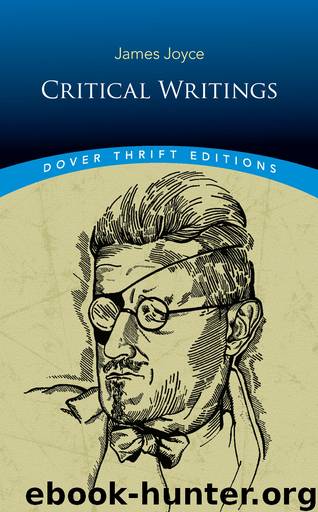Critical Writings by Joyce James;

Author:Joyce, James;
Language: eng
Format: epub
Publisher: Dover Publications
Published: 2018-08-24T16:00:00+00:00
AN IRISH POET
Review of Poems and Ballads of William Rooney.
THESE ARE THE verses of a writer lately dead, whom many consider the Davis of the latest national movement. They are issued from headquarters, and are preceded by two introductions wherein there is much said concerning the working man, mutual improvement, the superior person, shady musical plays, etc. They are illustrative of the national temper, and because they are so the writers of the introductions do not hesitate to claim for them the highest honours. But this claim cannot be allowed, unless it is supported by certain evidences of literary sincerity. For a man who writes a book cannot be excused by his good intentions, or by his moral character; he enters into a region where there is question of the written word, and it is well that this should be borne in mind, now that the region of literature is assailed so fiercely by the enthusiast and the doctrinaire. An examination of the poems and ballads of William Rooney does not warrant one in claiming for them any high honours. The theme is consistently national, so uncompromising, indeed, that the reader must lift an eyebrow and assure himself when he meets on page 114 the name of D’Arcy MacGee. But the treatment of the theme does not show the same admirable consistency. In “S. Patrick’s Day” and in “Dromceat” one cannot but see an uninteresting imitation of Denis Florence M’Carthy and of Ferguson; even Mr T. D. Sullivan and Mr Rolleston have done something in the making of this book. But “Roilig na Riogh” [sic] is utterly lacking in the high distinctive virtue of “The Dead at Clonmacnoise,” and Mr Rolleston, who certainly is not driven along by any poetic impulse, has written a poem because the very failure of the poetic impulse pleases in an epitaph. So much can careful writing achieve, and there can be no doubt that little is achieved in these verses, because the writing is so careless, and is yet so studiously mean. For, if carelessness is carried very far, it is like to become a positive virtue, but an ordinary carelessness is nothing but a false and mean expression of a false and mean idea. Mr Rooney, indeed, is almost a master in that “style,” which is neither good nor bad. In the verses of Maedhbh he writes:
’Mid the sheltering hills, by the spreading waters,
They laid her down and her cairn raised
The fiercest-hearted of Erin’s daughters—
The bravest nature that ever blazed.
Here the writer has not devised, he has merely accepted, mean expressions, and even where he has accepted a fine expression, he cannot justify his use of it. Mangan’s Homeric epithet of “wine-dark” becomes in his paper a colourless and meaningless epithet, which may cover any or all of the colours of the spectrum. How differently did Mangan write when he wrote:
Knowest thou the castle that beetles over
The wine-dark sea!
Here a colour rises in the mind and is set firmly against the golden glow in the lines that follow.
Download
This site does not store any files on its server. We only index and link to content provided by other sites. Please contact the content providers to delete copyright contents if any and email us, we'll remove relevant links or contents immediately.
Fearfully and Wonderfully Made by Philip Yancey & Paul Brand(588)
Christian Ethics by Wilkens Steve;(571)
Numbers by Ronald B. Allen(503)
The World from 1450 To 1700 by Wills John E.;(500)
Christian Ethics: An Introduction to Biblical Moral Reasoning by Wayne Grudem(478)
How to Read Slowly by James W. Sire(458)
God and the Multiverse by Victor J. Stenger(449)
Morality by Jonathan Sacks(432)
Monastic Archaeology by Unknown(408)
The Disabled Church by Rebecca F. Spurrier;(396)
Jesus: A New Vision by Whitley Strieber(371)
Critical Writings by Joyce James;(367)
Death of the Doctor by Unknown(366)
Amish Grace by Donald B. Kraybill & Nolt Steven M. & Weaver-Zercher David L(365)
Redeeming Sociology by Vern S. Poythress(364)
The Technological System by Jacques Ellul(352)
Children of Lucifer; The Origins of Modern Religious Satanism by Ruben van Luijk(352)
The Catholic Case for Trump by Austin Ruse(334)
The Church in the Early Middle Ages by G.R. Evans(332)
